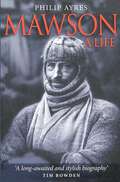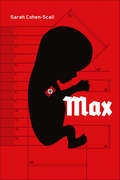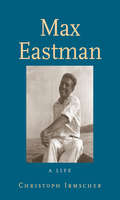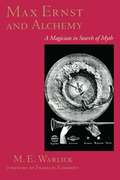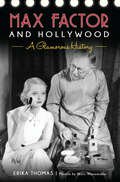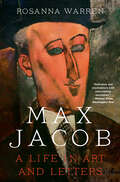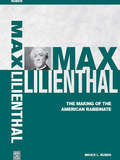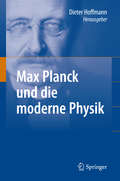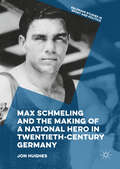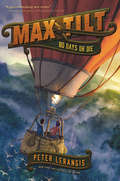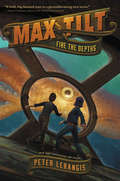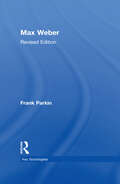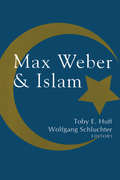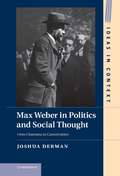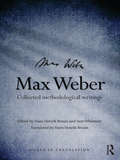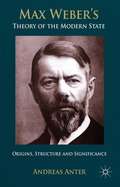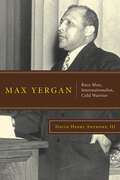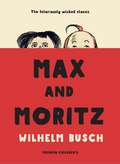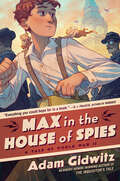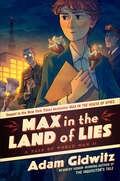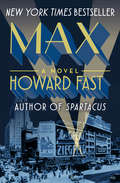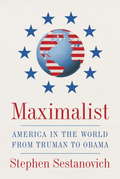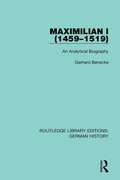- Table View
- List View
Mawson: A Life
by Philip AyresSir Douglas Mawson was Australia's pre-eminent Antarctic explorer, a tall, quiet scientist who survived several gruelling polar expeditions, and went on to play a notable role in the academic and research establishment.He is most famed for an ill-fated expedition in 1913, in which he trekked hundreds of kilometres alone, without supplies, after his two companions perished. But he was also the main architect of Australia's official Antarctic presence in the first half of the twentieth century, instrumental in the Australian Government's decision to claim part of Antarctica, and in the founding of Australia's major organization for Antarctic exploration and research.Philip Ayres' life of Mawson is the definitive biography of the polar explorer, who died in 1958. In this richly researched and well-illustrated work, he paints a picture of a man who was a brave and resourceful hero, but also a deeply flawed personality.
Max
by Sarah Cohen-ScaliNazi Germany 1936. The Lebensborn program is going strong as German women are carefully selected by the Nazis and recruited to give birth to new representatives of the Aryan race. Inside one of these women is Max, a fetus waiting to be born and fulfill his destiny as the perfect Aryan. Max is taken away from his birth mother as soon as he enters the world. He will be raised under the leadership and ideologies of the Nazi Party. As he grows up without a mom, without any affection or tenderness, according to Nazi educational precepts, he soon becomes the mascot of the program. But things don't go according to plan.Originally published in French, Sarah Cohen-Scali's touching, illuminating, and heartbreaking book has been translated for an English-speaking audience.A Neal Porter Book
Max Eastman: A Life
by Christoph IrmscherThe definitive biography of a radical activist and intellectual Max Eastman (1883–1969) was a prolific writer, radical, and public intellectual who helped shape the twentieth century. While researching this masterful work, acclaimed biographer Christoph Irmscher was granted unprecedented access to the Eastman family archive, allowing him to document little-known aspects of the famously handsome and charismatic radical. Considered one of the “hottest radicals” of his time, Eastman edited two of the most important modernist magazines, The Masses and The Liberator, and campaigned for women’s suffrage and world peace. A fierce critic of Joseph Stalin, Eastman befriended and translated Leon Trotsky and remained unafraid to express unpopular views, drawing criticism from both conservatives and the Left. Set against the backdrop of several decades of political and ideological turmoil, and interweaving Eastman’s singular life with stories of the fascinating people he knew and loved, this book will have broad interdisciplinary appeal in twentieth-century history and politics, intellectual history, and literary studies.
Max Ernst and Alchemy: A Magician in Search of Myth
by M. E. WarlickSurrealist artist Max Ernst defined collage as the "alchemy of the visual image." Students of his work have often dismissed this comment as simply a metaphor for the transformative power of using found images in a new context. Taking a wholly different perspective on Ernst and alchemy, however, M. E. Warlick persuasively demonstrates that the artist had a profound and abiding interest in alchemical philosophy and often used alchemical symbolism in works created throughout his career.
Max Factor and Hollywood: A Glamorous History
by Erika ThomasThe story of the makeup artist who changed the film industry—and the world of modern cosmetics. Includes photos. When Polish wigmaker and cosmetician Max Factor arrived in Los Angeles at the dawn of the motion picture industry, &“make-up&” had been associated only with stage performers and ladies of the oldest profession. Appalled by the garish paints worn by actors, Factor introduced the first &“flexible&” greasepaint for film in 1914. With a few careful brush strokes, a lot of innovation, and the kind of luck that can happen only in Hollywood, Max Factor changed the meaning of glamour. His innovations can be experienced in every tube of lipstick, palette of eye shadow, and bottle of nail lacquer used today. Join author Erika Thomas as she reveals the makeup guru's expert beauty tips and the story of how he created the most iconic golden-era looks that are as relevant today as they were nearly a century ago.
Max Horkheimer and the Foundations of the Frankfurt School
by John AbromeitThis book is the first comprehensive intellectual biography of Max Horkheimer during the early and middle phases of his life (1895-1941). Drawing on unexamined new sources, John Abromeit describes the critical details of Horkheimer's intellectual development. This study recovers and reconstructs the model of early Critical Theory that guided the work of the Institute for Social Research in the 1930s. Horkheimer is remembered primarily as the co-author of Dialectic of Enlightenment, which he wrote with Theodor W. Adorno in the early 1940s. But few people realize that Horkheimer and Adorno did not begin working together seriously until the late 1930s or that the model of Critical Theory developed by Horkheimer and Erich Fromm in the late 1920s and early 1930s differs in crucial ways from Dialectic of Enlightenment. Abromeit highlights the ways in which Horkheimer's early Critical Theory remains relevant to contemporary theoretical discussions in a wide variety of fields.
Max Jacob: A Life In Art And Letters
by Rosanna WarrenA comprehensive and moving biography of Max Jacob, a brilliant cubist poet who lived at the margins of fame. Though less of a household name than his contemporaries in early twentieth century Paris, Jewish homosexual poet Max Jacob was Pablo Picasso’s initiator into French culture, Guillaume Apollinaire’s guide out of the haze of symbolism, and Jean Cocteau’s loyal friend. As Picasso reinvented painting, Jacob helped to reinvent poetry with compressed, hard-edged prose poems and synapse-skipping verse lyrics, the product of a complex amalgamation of Jewish, Breton, Parisian, and Roman Catholic influences. In Max Jacob, the poet’s life plays out against the vivid backdrop of bohemian Paris from the turn of the twentieth century through the divisions of World War II. Acclaimed poet Rosanna Warren transports us to Picasso’s ramshackle studio in Montmartre, where Cubism was born; introduces the artists gathered at a seedy bar on the left bank, where Max would often hold court; and offers a front-row seat to the artistic squabbles that shaped the Modernist movement. Jacob’s complex understanding of faith, art, and sexuality animates this sweeping work. In 1909, he saw a vision of Christ in his shabby room in Montmartre, and in 1915 he converted formally from Judaism to Catholicism—with Picasso as his godfather. In his later years, Jacob split his time between Paris and the monastery of Benoît-sur-Loire. In February 1944, he was arrested by the Gestapo and sent to Drancy, where he would die a few days later. More than thirty years in the making, this landmark biography offers a compelling, tragic portrait of Jacob as a man and as an artist alongside a rich study of his groundbreaking poetry—in Warren’s own stunning translations. Max Jacob is a nuanced, deeply researched, and essential contribution to Modernist scholarship.
Max Lilienthal: The Making of the American Rabbinate
by Bruce L. RubenExplores the life and thought of Rabbi Max Lilienthal, who created a new model for the American rabbinate.
Max Planck und die moderne Physik
by Dieter HoffmannMax Planck (1858-1947) zählt zu den herausragenden Physikern des zwanzigsten Jahrhunderts. Seine Quantenhypothese wurde zur Grundlage für die Entwicklung der Quantentheorie und bildet eine der zentralen Säulen der modernen Physik. Damit ist Plancks Wirken jedoch keineswegs erschöpfend charakterisiert: In diesem Buch arbeiten anerkannte Physikhistoriker das gesamte Spektrum von Plancks physikalischem Schaffen heraus und würdigen seine Bedeutung für die Entwicklung der modernen Physik.
Max Schmeling and the Making of a National Hero in Twentieth-Century Germany
by Jon HughesThis book presents the first in-depth study of the German boxer Max Schmeling (1905-2005) as a national hero and representative figure in Germany between the 1920s and the present day. It explores the complex relationship between sport, culture, politics and national identity and draws on a century of journalism, film, visual art, life writing and fiction. Detailed chapters analyse Schmeling's emergence as an icon in the Weimar Republic, his association with America, his celebrity status in the Third Reich, and his rivalry with Joe Louis as a focus for an extraordinary propaganda and ideological contest. The book also examines how Schmeling's post-war success in business associated him with the culture of the 'zero hour' nation in the era of 'economic miracle', and how he was later claimed as 'good German' and moral example for a post-war generation of Germans determined to 'come to terms' with the past. This book will appeal to readers with an interest in the history and representation of sport and boxing, in sports discourse and political culture, and in questions of national identity in modern German history.
Max Schmeling und die Entstehung eines Nationalhelden in Deutschland im zwanzigsten Jahrhundert
by Jon HughesDieses Buch ist die erste umfassende Studie über den deutschen Boxer Max Schmeling (1905-2005) als Nationalheld und Repräsentationsfigur in Deutschland zwischen den 1920er Jahren und der Gegenwart. Es untersucht die komplexen Beziehungen zwischen Sport, Kultur, Politik und nationaler Identität und stützt sich dabei auf ein Jahrhundert von Journalismus, Film, bildender Kunst, Lebensberichten und Belletristik. Detaillierte Kapitel analysieren Schmelings Aufstieg zur Ikone in der Weimarer Republik, seine Verbindung zu Amerika, seinen Prominentenstatus im Dritten Reich und seine Rivalität mit Joe Louis als Mittelpunkt eines außergewöhnlichen propagandistischen und ideologischen Wettstreits. Das Buch untersucht auch, wie Schmelings geschäftlicher Erfolg in der Nachkriegszeit ihn mit der Kultur der "Stunde Null" in der Ära des "Wirtschaftswunders" in Verbindung brachte und wie er später als "guter Deutscher" und moralisches Beispiel für eine Nachkriegsgeneration von Deutschen, die entschlossen waren, die Vergangenheit zu "bewältigen", in Anspruch genommen wurde. Das Buch richtet sich an Leser, die sich für die Geschichte des Sports und des Boxens, für Sportdiskurse und politische Kultur sowie für Fragen der nationalen Identität in der modernen deutschen Geschichte interessieren.
Max Tilt: 80 Days Or Die (Max Tilt #2)
by Peter LerangisThe New York Times bestselling author of the Seven Wonders series and of books in the 39 Clues series, Peter Lerangis, brings us the hair-raising, edge-of-your-seat second installment of the Max Tilt trilogy. <P><P>When thirteen-year-old Max Tilt stumbled across his great-great-great-grandfather Jules Verne’s unfinished, unpublished manuscript, The Lost Treasures, he thought he had the answer to all his problems, but nothing in life is ever that easy. With his mom’s illness getting worse again, Max needs to figure out a way to save his family—now more than ever. <P><P>So Max and his cousin Alex revisit The Lost Treasures, and they find a clue that just might be the key to a cure. It’s the story of Verne’s seemingly impossible recovery from a near-fatal gunshot wound. Somehow, after being shot, Verne didn’t just survive, he thrived. <P><P>And the book hints that he was only able to do so after collecting magical healing elements that he’d saved from a race around the world. <P><P>Piecing together hints from Verne’s Around the World in 80 Days and his lost manuscript, Max and Alex realize there’s a way to save Max’s mom if they’re daring enough to try. It’s a race against time in the second installment of the action-packed adventure series from master storyteller and New York Times bestselling author Peter Lerangis.
Max Tilt: Fire the Depths (Max Tilt #1)
by Peter Lerangis“A bold, big-hearted start to a groundbreaking new series.” —Soman Chainani, author of The School for Good and EvilThe New York Times bestselling author of the Seven Wonders series and books in the 39 Clues series, Peter Lerangis, brings us the enthralling first installment of the adventure-filled Max Tilt trilogy. When thirteen-year-old Max Tilt happens upon his great-great-great-grandfather Jules Verne’s unfinished, unpublished manuscript, The Lost Treasures, he doesn’t realize that he’s found the answers to all his problems. And Max has a lot of problems—his mother is sick, his father is out of work, and his home is about to be foreclosed on. But when Max and his cousin Alex discover that Verne’s last work reveals everything he wrote was fact, not fiction, they realize that the book holds the key to something incredibly valuable. A treasure that can save his house—and maybe his entire family.But Max and Alex aren’t the only ones who know about Verne’s clues. Spencer Niemend, a strange skunk-haired man who has spent his life researching Verne’s works, is bent on reshaping the world with the hidden treasure. To find it first, Max and Alex must go on an adventure that’ll take them from the broken remains of an underwater city to the very jaws of a giant squid to the edges of a whirlpool from which no one has ever emerged alive. This is the first book in a new hair-raising, edge-of-your-seat adventure series from master storyteller and New York Times bestselling author Peter Lerangis.
Max Weber (Key Sociologists Ser.)
by Frank ParkinThis study of Weber's sociology, written by an eminent authority, is a clear and illuminating discussion of the most important elements of Weber's thinking. The book concentrates on four main elements of Weber's work: his approach to sociological method, ethical neutrality and historical explanation; his influential work on religion and capitalism; his theory of authority and political power; and his contribution to the analysis of class, status and party.
Max Weber and Islam
by Wolfgang SchluchterMax Weber and Islam is a major effort by Islamic-studies specialists to reexamine and appraise Max Weber's perspectives on Islam and its historical development. Eight specialists on Islam and two sociologists explore many dimensions of Weber's comments on Islam, along with Weber's conceptual framework. The volume's introduction links the discussions to contemporary issues and debates.Wolfgang Schluchter reconstructs Weber's conceptual apparatus as it applies to Islam and its historical development. In subsequent chapters, Islamic specialists consider such major topics as the developmental history of Islam, Islamic fundamentalism, Islamic reform, Islamic law and capitalism, secularization in Islam, as well as the value of attempting to apply Weber's concept of sects to Islam. While some authors find flaws in Weber's factual knowledge of Islam, they also find considerable merit in the kinds of questions Weber raised.Contributors to the volume include highly respected contemporary international scholars of Islam: Ira Lapidus, Nehemia Levtzion, Richard M. Eaton, Peter Hardy, Rudolph Peters, Barbara Metcalf, Francis Robinson, Patricia Crone, Michael Cook, and S.N. Eisenstadt. Toby Huff's introduction not only knits the thematics of the separate essays together but adds its own stresses while engaging the contributors in dialogue and debate about fundamental issues. This acute collective analysis establishes a new benchmark for understanding Weber and Islam. This book also provides an up-to-date overview of the developmental history of many aspects of Islam. A major reappraisal of the entire span of Max Weber's sociological thought on Islam, this book will appeal to a wide range of scholars and laymen interested in the Islamic world. It will be of particular interest to sociologists specializing in religion and Middle East area specialists.
Max Weber in Politics and Social Thought: From Charisma to Canonization
by Joshua DermanMax Weber is widely regarded as one of the foundational thinkers of the twentieth century. But how did this reclusive German scholar manage to leave such an indelible mark on modern political and social thought? Max Weber in Politics and Social Thought is the first comprehensive account of Weber's wide-ranging impact on both German and American intellectuals. Drawing on a wide range of sources, Joshua Derman illuminates what Weber meant to contemporaries in the Weimar Republic and Nazi Germany and analyzes why they reached for his concepts to articulate such widely divergent understandings of modern life. The book also accounts for the transformations that Weber's concepts underwent at the hands of émigré and American scholars, and in doing so, elucidates one of the major intellectual movements of the mid-twentieth century: the transatlantic migration of German thought.
Max Weber: Collected Methodological Writings (Weber in Translation)
by Sam Whimster Hans Henrik BruunWeber’s methodological writings form the bedrock of key ideas across the social sciences. His discussion of value freedom and value commitment, causality, understanding and explanation, theory building and ideal types have been of fundamental importance, and their impact remains undiminished today. These ideas influence the current research practice of sociologists, historians, economists and political scientists and are central to debates in the philosophy of social science. But, until now, Weber's extensive writings on methodology have lacked a comprehensive publication. Edited by two of the world's leading Weber scholars, Collected Methodological Writings will provide a completely new, accurate and reliable translation of Weber’s extensive output, including previously untranslated letters. Accompanying editorial commentary explains the context of, and interconnections between, all these writings, and additional useful features include a glossary of German terms and an English key, endnotes, bibliography, and person and subject indexes.
Max Weber’s Theory of the Modern State
by Andreas AnterAndreas Anter reconstructs Max Weber's theory of the modern state, showing its significance to contemporary political science. He reveals the ambivalence of Weber's political thought: the oscillation between an #65533;tatiste position, mainly oriented to the reason of state, and an individualistic one, focussed on the freedom of individuals
Max Yergan: Race Man, Internationalist, Cold Warrior
by David Henry Anthony, IIIIn his long and fascinating life, black activist and intellectual Max Yergan (1892-1975) traveled on more ground—both literally and figuratively—than any of his impressive contemporaries, which included Adam Clayton Powell, Paul Robeson, W.E.B. Du Bois, and A. Phillip Randolph. Yergan rose through the ranks of the "colored" work department of the YMCA, and was among the first black YMCA missionaries in South Africa. His exposure to the brutality of colonial white rule in South Africa caused him to veer away from mainstream, liberal civil rights organizations, and, by the mid-1930s, into the orbit of the Communist Party. A mere decade later, Cold War hysteria and intimidation pushed Yergan away from progressive politics and increasingly toward conservatism. In his later years he even became an apologist for apartheid.Drawing on personal interviews and extensive archival research, David H. Anthony has written much more than a biography of this enigmatic leader. In following the winding road of Yergan’s life, Anthony offers a tour through the complex and interrelated political and institutional movements that have shaped the history of the black world from the United States to South Africa.
Max and Moritz: Large Print (Dover Humor Ser.)
by Wilhelm BuschA lively NEW TRANSLATION of this anarchic children's classic alongside CLASSIC ORIGINAL ARTWORK.A nostalgia pick, 19th-Century sensibility but THE foundational classic of German children's literature. As irreverant as The Cat in the Hat, though 92 years older, and dark!Max and Moritz is perhaps the defining classic of German children's literature. In this darkly hilarious story, two young boys exercise their talent for ingenious mischief in a variety of dazzling tricks. Whether stealing a widow's chickens through her chimney or filling their teacher's pipe with gunpowder, Max and Moritz bring chaos and comedy wherever they go.Containing all of the original illustrations, this new translation by Mark Ledsom brings the original's rhyming couplets to vibrant life and promises to delight a new generation of young readers.
Max in the House of Spies: A Tale of World War II (Operation Kinderspion)
by Adam GidwitzAn acclaimed Best Book of 2024! Instant New York Times bestseller • Wall Street Journal Best Books of the Year • Booklist Editors’ Choice • Publishers Weekly Best Books of the Year • School Library Journal Best Books of the Year • Common Sense Best Books of the Year • Imagination Soup Best Books of the Year • Tablet Magazine Best Books of the Year <p> “Max in the House of Spies is everything you could hope for in a book,” -R. J. Palacio, #1 New York Times bestselling author of Wonder, White Bird, and Pony. <p> “Espionage! Secrets! Suspense! If you’ve ever dreamed of being a spy, this book is for you.” -Alan Gratz, #1 New York Times bestselling author of Refugee and Projekt 1065. <p> Max Bretzfeld doesn’t want to move to London. Leaving home is hard and Max is alone for the first time in his life. But not for long. Max is surprised to discover that he’s been joined by two unexpected traveling companions, one on each shoulder, a kobold and a dybbuk named Berg and Stein. Germany is becoming more and more dangerous for Jewish families, but Max is determined to find a way back home, and back to his parents. He has a plan to return to Berlin. It merely involves accomplishing the impossible: becoming a British spy. <p> The first book in a duology, Max in the House of Spies is a thought-provoking World War II story as only acclaimed storyteller Adam Gidwitz can tell it—fast-paced and hilarious, with a dash of magic and a lot of heart.
Max in the Land of Lies: A Tale of World War II (Operation Kinderspion)
by Adam GidwitzMax Bretzfeld is back in Berlin where his most dangerous mission is about to begin! The thrilling conclusion to the World War II spy duology that began with Max in the House of Spies.″A headlong thriller laced with provocative and topical historical truths.&” –Kirkus, starred reviewMax is on a mission.Well, two missions.One has been assigned by his British spymasters: Infiltrate the Funkhaus, the center of Nazi radio and propaganda. The other they have forbidden: Find his parents.Max Bretzfeld was willing to do anything to return to Germany, even become a British spy. Training complete and forged papers in hand, the radio wunderkind&’s missions have begun. But nothing is as he expected. His parents are missing. Nazi intelligence is watching him. And the lines between lies and truth are becoming more blurred every day. Max will need every tool at his disposal, from his radio expertise and spy training to the help of Berg and Stein, the immortal creatures living on his shoulders. Even so, there&’s no guarantee he&’ll make it out of Berlin alive.
Max: A Novel
by Howard FastThe New York Times–bestselling novel of one man&’s journey from New York&’s slums to become one of America&’s first film moguls—from the author of Spartacus. Max tells the story of the rise of Max Britsky, entwined with the film industry&’s beginnings near the turn of the twentieth century. When he was twelve, Max&’s father died, leaving him to scrape out a living in Manhattan&’s Lower East Side slums to provide for his mother and siblings. But Max was a natural entrepreneur, and he followed his business instincts and love of the theater to become one of the first film moguls in the history of American moviemaking. Britsky&’s life story is tragic and triumphant, and yet another example of the unmatched storytelling prowess of Howard Fast, one of the most prolific and widely read authors of the twentieth century. This ebook features an illustrated biography of Howard Fast including rare photos from the author&’s estate.
Maximalist
by Stephen SestanovichFrom a writer with long and high-level experience in the U.S. government, a startling and provocative assessment of America's global dominance. Maximalist puts the history of our foreign policy in an unexpected new light, while drawing fresh, compelling lessons for the present and future. When the United States has succeeded in the world, Stephen Sestanovich argues, it has done so not by staying the course but by having to change it--usually amid deep controversy and uncertainty. For decades, the United States has been a power like no other. Yet presidents and policy makers worry that they--and, even more, their predecessors--haven't gotten things right. Other nations, they say to themselves, contribute little to meeting common challenges. International institutions work badly. An effective foreign policy costs too much. Public support is shaky. Even the greatest successes often didn't feel that way at the time. Sestanovich explores the dramatic results of American global primacy built on these anxious foundations, recounting cycles of overcommitment and underperformance, highs of achievement and confidence followed by lows of doubt. We may think there was a time when America's international role reflected bipartisan unity, policy continuity, and a unique ability to work with others, but Maximalist tells a different story--one of divided administrations and divisive decision making, of clashes with friends and allies, of regular attempts to set a new direction. Doing too much has always been followed by doing too little, and vice versa. Maximalist unearths the backroom stories and personalities that bring American foreign policy to life. Who knew how hard Lyndon Johnson fought to stay out of the war in Vietnam--or how often Henry Kissinger ridiculed the idea of visiting China? Who remembers that George Bush Sr. found Ronald Reagan's diplomacy too passive--or that Bush Jr. considered Bill Clinton's too active? Leaders and scoundrels alike emerge from this retelling in sharper focus than ever before. Sestanovich finds lessons in the past that anticipate and clarify our chaotic present. From the Hardcover edition.
Maximilian I: An Analytical Biography (Routledge Library Editions: German History #1)
by Gerhard BeneckeWhen originally published in 1982 this was the first biography of Maximilian I to appear in English for half a century. It assesses a man who was Holy Roman Emperor, founder of the modern Austrian state and the grandfather of Charles V and Ferdinand I. Maximilian was a key figure and an appreciation of his role and career is vital to an overall view of European society and politics at the dawning of modern times. The book gives an insight into Maximilian’s style of government and reveals the underlying personal factors that determined many of the key decisions which influenced politics and control during his reign.
